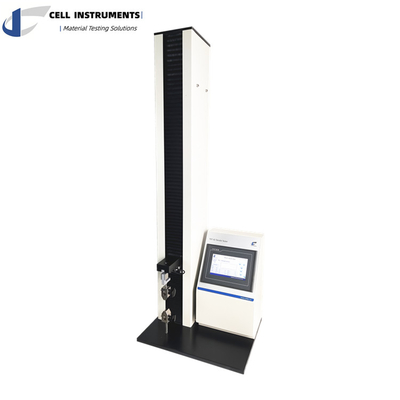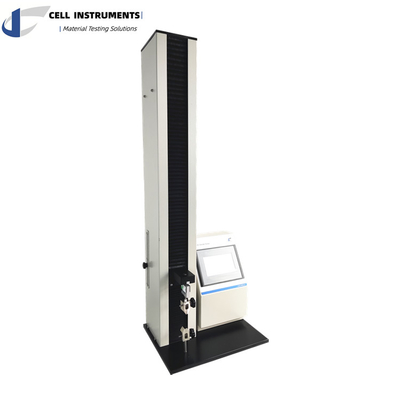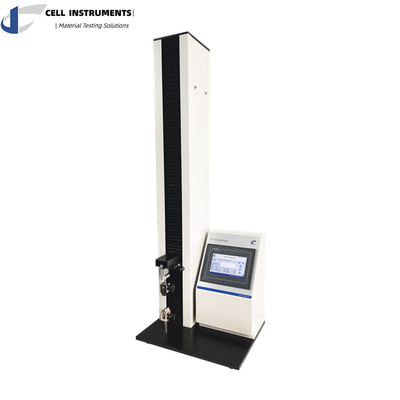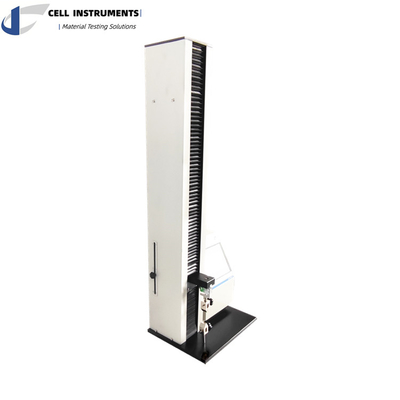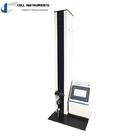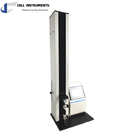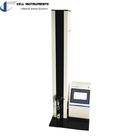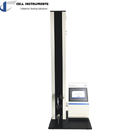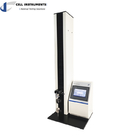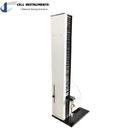Textile Fabrics Breaking Strength And Elongation Testing Equipment Astm D5034 Strip Method Tensile Tester
| Test Range | 0-500N (or 50N, 100N, 200N, Etc) | Stroke | 800mm (customizable For Other Strokes) |
|---|---|---|---|
| Test Speed | 1~500mm/min | Displacement Accuracy | 0.01mm |
| Accuracy | 0.5% Full Scale | Sample Width | 27mm (optional Width Available) |
| Control | PLC And HMI Screen | Data Output | Microprinter (optional), RS232 (optional) |
Textile Fabrics Breaking Strength And Elongation Testing Equipment Astm D5034 Strip Method Tensile Tester
Introduction to the Tensile Tester
The Tensile Tester is a critical tool in the testing and quality control of flexible laminates, providing detailed insights into the mechanical properties of materials. Flexible laminates are used extensively across a variety of industries including packaging, automotive, aerospace, and electronics. Whether you're in packaging or manufacturing, ensuring the quality of your materials is vital. The Tensile Tester plays a crucial role in assessing key material properties such as tensile strength, elongation, and adhesion strength, which are all integral to ensuring product integrity.
What is a Tensile Tester?
A Tensile Tester is a device used to apply a controlled force to a material until it breaks or undergoes a predetermined deformation. The test measures the material’s tensile strength, elongation, and other mechanical properties. These tests are essential for flexible laminates as they help manufacturers ensure that their products meet the required performance standards and comply with industry regulations.
Significance of Tensile Testing in Quality Inspection
-
Material Strength Assessment:
The Tensile Tester allows manufacturers to evaluate the maximum stress that a material can withstand before failure. By assessing the tensile strength, manufacturers can ensure the material’s durability in various applications, from packaging to aerospace. -
Elongation Properties:
Flexibility is a crucial requirement for many materials. The Tensile Tester helps assess how much a material can stretch before breaking, ensuring that it meets specific elongation requirements for applications that require flexibility, such as food packaging and medical devices. -
Adhesion Strength:
For laminated materials, the bond strength between layers is critical. The Tensile Tester helps assess the adhesion strength, ensuring that multi-layered materials maintain their integrity during usage. -
Compliance with Industry Standards:
The Tensile Tester is essential for meeting key industry standards like ASTM D5034, ASTM D3330, and ISO 527, making sure that products adhere to required testing procedures for tensile strength, elongation, and peel adhesion.
Features of the Tensile Tester
The Tensile Tester is designed for high-precision testing with a wide range of applications in various industries. Below are the key features:
-
PLC Control & HMI Touch Screen:
The machine is controlled through a PLC system with a user-friendly 7-inch TFT touch screen for easy operation and real-time monitoring. -
Precision Ball Lead Screw Mechanism:
The Tensile Tester uses a precision ball lead screw mechanism that ensures consistent and accurate speed and displacement control for reliable testing results. -
Adjustable Test Speed:
The test speed is adjustable from 1 mm/min to 500 mm/min, giving you flexibility to test materials under various conditions. -
Wide Compatibility:
The Tensile Tester can be used with various fixtures, making it versatile for testing different material types and sizes. -
Advanced Data Output Options:
The machine offers microprinter and RS232 data communication ports, enabling easy data collection and integration with professional software. -
Automatic Return and Limiting Device:
For safety and efficiency, the Tensile Tester is equipped with an automatic returning function and a limiting device. -
Customizable Stroke and Test Range:
The test range is adjustable from 0-500N (with optional configurations for 50N, 100N, and 200N), and the stroke is customizable up to 800mm.
Main Parameters of the Tensile Tester
| Parameter | Specification |
|---|---|
| Test Range | 0-500N (or 50N, 100N, 200N, etc.) |
| Stroke | 800mm (customizable) |
| Test Speed | 1~500mm/min |
| Displacement Accuracy | 0.01mm |
| Accuracy | 0.5% Full Scale |
| Sample Width | 27mm (optional widths available) |
| Control | PLC & HMI Screen |
| Data Output | Microprinter (optional), RS232 (optional) |
Related Standards
The Tensile Tester complies with numerous international standards, ensuring it meets industry specifications for tensile testing:
- ASTM D3330 – Standard Test Method for Peel Adhesion of Pressure-Sensitive Tape
- ASTM D3759 – Standard Test Method for Tensile Strength and Elongation of Pressure-Sensitive Tapes
- ISO 527 – Plastics - Determination of Tensile Properties
- ASTM F904 – Standard Test Method for Comparison of Bond Strength or Ply Adhesion of Similar Laminates Made from Flexible Materials
These standards outline the testing procedures for flexible materials, providing manufacturers with the necessary guidelines to ensure product quality and regulatory compliance.
Application Areas of the Tensile Tester
The Tensile Tester is widely used across various industries that require accurate testing of flexible materials, including:
-
Packaging Industry:
The Tensile Tester helps ensure that packaging materials, such as laminates, films, and tapes, meet strength and elongation requirements. This is essential for the production of durable and reliable packaging for food, pharmaceuticals, and consumer goods. -
Food Industry:
For flexible food packaging, the Tensile Tester is used to test the material’s resistance to breakage and deformation under stress, ensuring product integrity and safety during storage and transport. -
Automotive Industry:
The automotive sector uses the Tensile Tester to assess the strength and flexibility of materials used in vehicle components, ensuring durability and safety. -
Aerospace Industry:
In aerospace, materials must meet rigorous tensile strength and elongation standards to withstand extreme conditions. The Tensile Tester is used to validate materials used in aircraft components. -
Electronics Industry:
Flexible materials in electronics, such as conductive films and insulating layers, are tested using the Tensile Tester to ensure reliability and performance. -
Medical Industry:
The Tensile Tester ensures that medical packaging materials, such as sterilization pouches, are strong enough to maintain product sterility and integrity.
Conclusion
The Tensile Tester is an indispensable tool for manufacturers looking to ensure the quality and reliability of their flexible materials. By providing precise measurements of tensile strength, elongation, and adhesion properties, this machine supports product development, quality assurance, and compliance with industry standards. Whether you're working in packaging, automotive, aerospace, or electronics, the Tensile Tester is an essential device for material testing, helping manufacturers maintain high-quality production standards.
![]()
![]()



